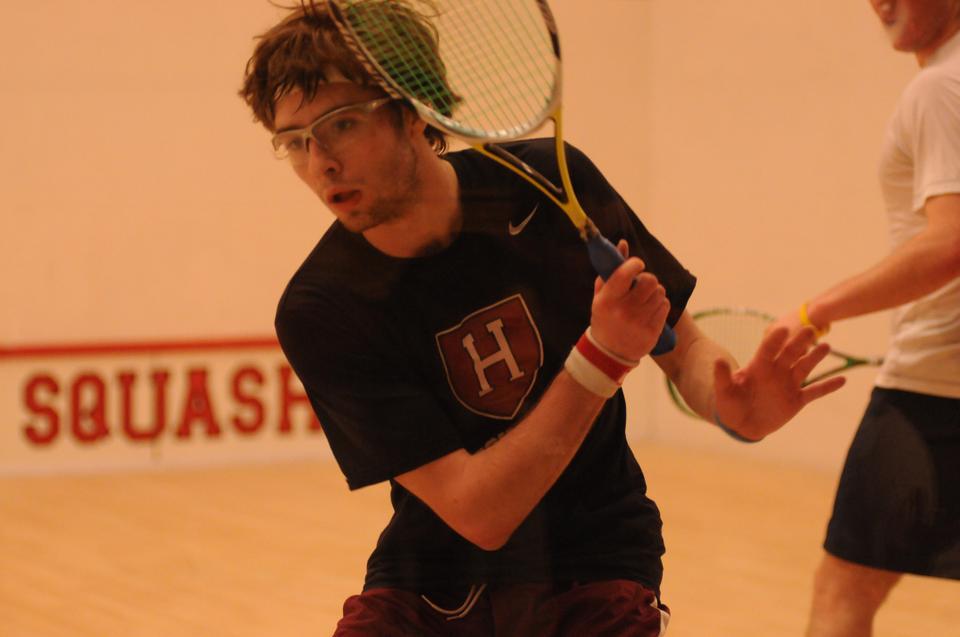
News
Summers Will Not Finish Semester of Teaching as Harvard Investigates Epstein Ties

News
Harvard College Students Report Favoring Divestment from Israel in HUA Survey

News
‘He Should Resign’: Harvard Undergrads Take Hard Line Against Summers Over Epstein Scandal

News
Harvard To Launch New Investigation Into Epstein’s Ties to Summers, Other University Affiliates

News
Harvard Students To Vote on Divestment From Israel in Inaugural HUA Election Survey
Trinity Regains Form, Tops Men's Squash

After dropping a close 5-4 contest at home against No. 3 Princeton last weekend, the Harvard men’s squash team (10-2, 2-1 Ivy) hoped to rebound with a win over No. 1 Trinity (9-1, 1-0 NESCAC) Saturday afternoon in Hartford, Conn. But the top-ranked Bantams had other plans, sealing a victory after just five individual matchups and eventually taking down the Crimson, 7-2.
“We didn’t play well,” sophomore Gary Power said. “Trinity was coming off of a loss to Yale, and they were determined to win. That determination really shined through. Maybe that’s a lesson to be learned because, on paper, we’re just as talented as them.”
Just three days before the matchup between two of the most storied men’s squash programs in the country, Trinity lost its first match in 13 years at Yale’s Brady Squash Center. The Bulldogs’ victory ended a 252-game winning streak—the longest in the history of intercollegiate athletics.
“You have to give a lot of credit to Yale on that one,” freshman Nick Hopcroft said. “They put together a great performance. Trinity and Yale are both very strong teams....Yale has trained hard and put a lot of hours in [since Ivy Scrimmages]. The season’s very long, and we’re going to have to come back much stronger if we want to try to win Ivies and Nationals.”
But the Bantams appeared to be back in top form on Saturday. Despite strong final-cycle efforts from sophomores Ali Farag and Power, who won their matchups at the No. 1 and No. 4 spots, respectively, Harvard’s early struggles left no room for a comeback.
“We got off to an extremely bad start, losing the first five matches, and they completely stopped us,” Hopcroft said. “The whole team contributed, but everyone was extremely down [after that].”
After taking the first game against Trinity’s Johan Detter, 11-3, Power’s opponent tied it up at one game apiece with an 11-7 victory in the second. But Power came back strong, taking the final two games, 11-7 and 11-6, respectively, to earn a 3-1 individual win.
At the No. 1 spot, Farag claimed the third victory of his Harvard career, picking up a win over Vikram Malhotra in four games. The match marked Farag’s second straight victory over a member of the 2010-11 All-America First Team, as the sophomore took down the reigning national individual champion—Princeton’s Todd Harrity—in a five-game thriller during Harvard’s recent contest against the Tigers.
“Ali is the best in the world for his age, and we’re extremely lucky to have a player of his caliber on the team,” Hopcroft said. “He recently beat two of the best players in the country…without even playing his best squash. He’s a harder worker than I think anyone on the team, and it’s great to see him do well.”
Despite the 7-2 final, most of Harvard’s individual matchups against the Bantams were close. Sophomore Nigel Koh, who is also a Crimson business editor, took his opponent at the No. 5 spot to five games, winning two straight to open the matchup but eventually falling, 3-2.
Junior Zeke Scherl and sophomore Tommy Mullaney also dropped tight, five-game matchups for Harvard at the No. 8 and No. 9 spots. The Crimson took home at least one game in all but one of its matchups.
“It’s most important for us to start working harder on getting into better physical shape,” Power said. “We lost three five-gamers, three four-gamers, and those close matches really tip the balance. That’s where we need to improve if we want to win a national championship.”
For the first time in at least a decade, this year’s Potter Cup has no clear favorite with Yale’s recent victory over the Bantams giving it an edge as the current team to beat.
“In the past few years, it’s basically been Trinity winning the national title,” Power said. “This year, there are probably about six teams that could win....That definitely makes it more interesting.”
And if a Harvard squad with eight underclassmen currently playing in the top nine hopes to contend for its first national title since 1998, it will need to go through Trinity or Yale, not to mention Princeton, Cornell, and Rochester.
“A lot of it is mental,” Power said. “We want to go into a match with a little more confidence. And a little of that showed yesterday. We need to get our heads down and start training harder. We have a lot of really close matches, and those will determine where the national title ends up.”
—Staff writer Catherine E. Coppinger can be reached at ccoppinger@college.harvard.edu.
Want to keep up with breaking news? Subscribe to our email newsletter.
